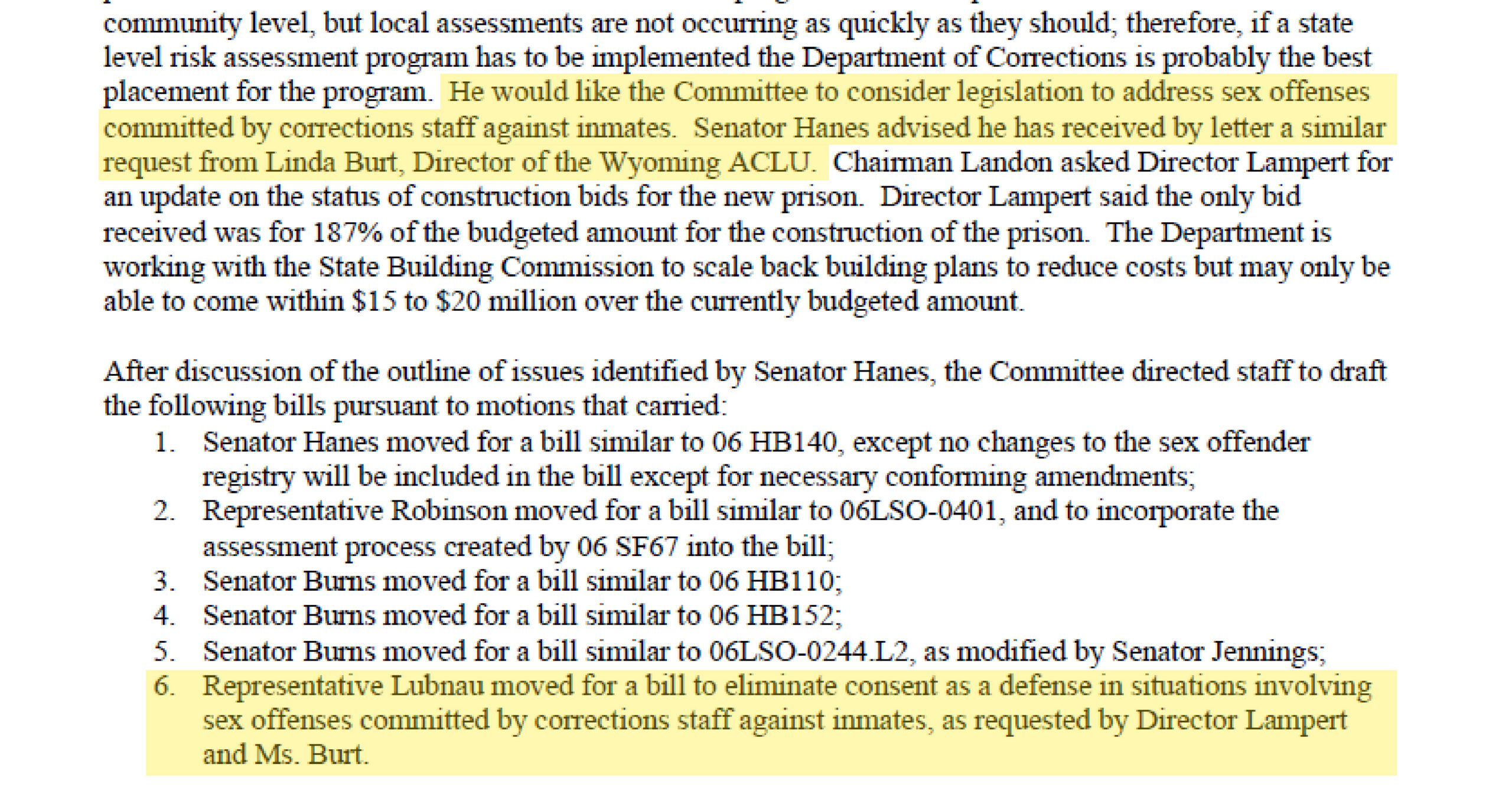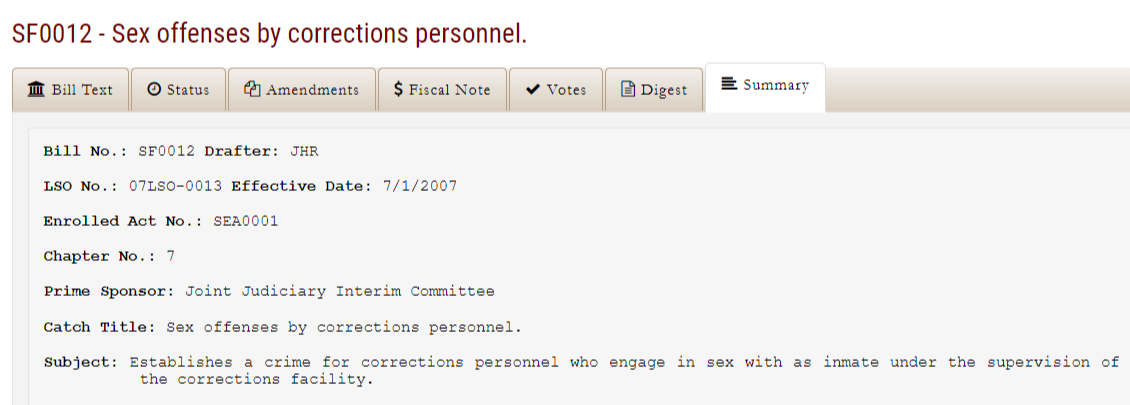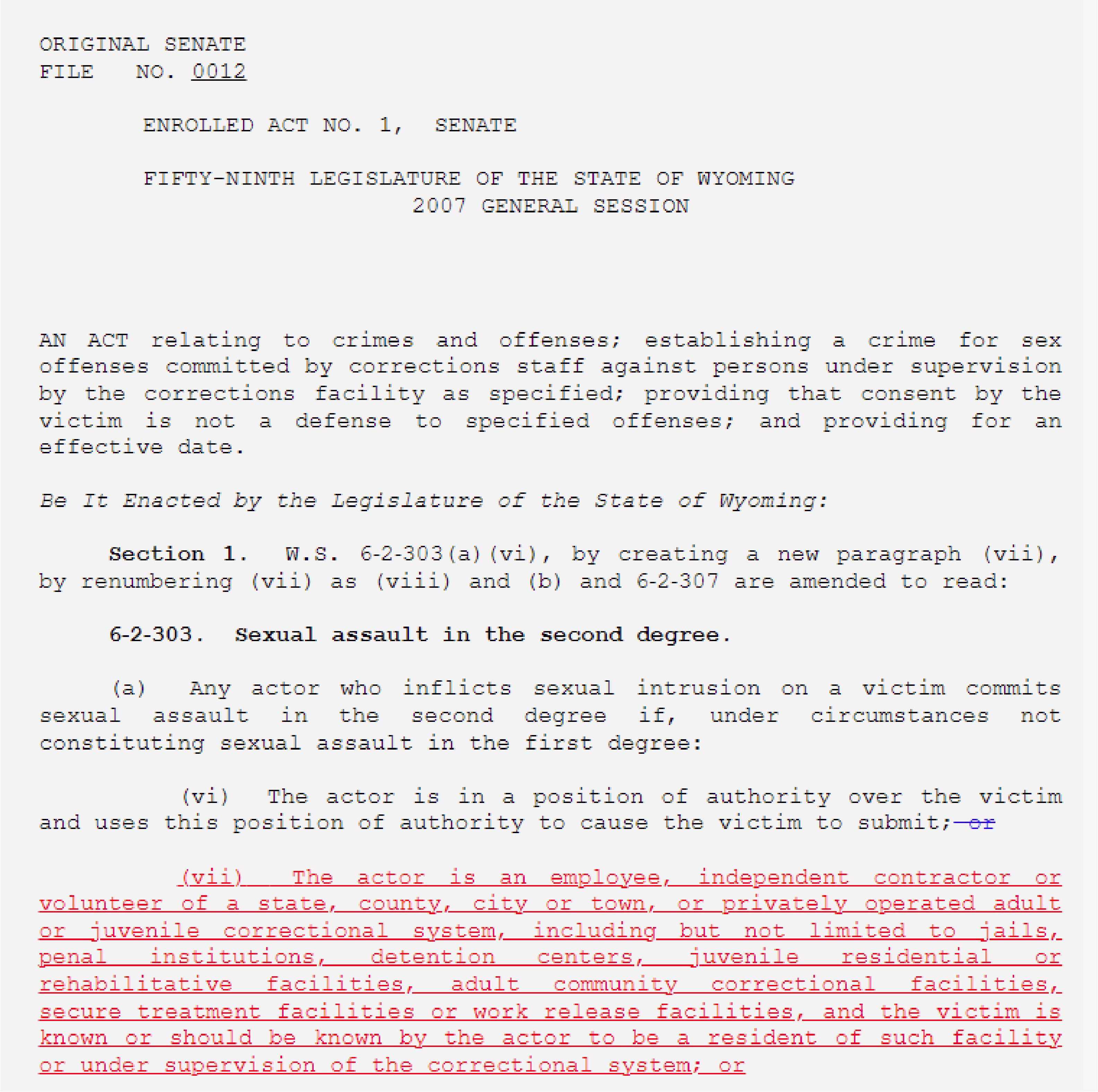ABOUT
After a friend was the victim of a date rape in the 1990’s, I became interested in a criminal justice career. I worked for thirteen years as a Probation & Parole Agent with the Wyoming Department of Corrections. Among the many duties I had over those years, I supervised sex offenders. I prepared pre-sentence investigations and helped sexual assault victims find justice. I helped hold sex offenders accountable when they violated their probation. I even served on the Governor’ Substance Abuse & Violent Crime Advisory Board. I was an “Employee of the year.”
Now? Now, I am a registered sex offender.
In 2012, my difficult job and a stressful relationship led to many mental health difficulties and poor choices. I spent a few hours a week meeting some clients in a local treatment center. A former client of mine who was still on probation and being supervised by a colleague worked in the kitchen of the treatment center. I let my guard down and started seeing her as more of an “equal.” When I was there each week, she would sometimes bring me something she had made or baked in the kitchen to try.
The following year, she invited me to come by her apartment some time to say hello. I did this at some point and when I was headed out the door, she kissed me. At the time, I was in the process of getting out of a bad marriage and was very unhappy with my life. I needed something that made me feel good and that made me happy. I could not believe that a younger and fairly attractive women could be attracted to or interested in me. I quickly became infatuated with the idea of getting involved with her. My self-esteem was so low and I was so miserable, I decided I would kill myself if I got involved with her and was caught.
It was abundently clear to me that any possible relationship with her was morally wrong and a violation of my oath that would get me fired. I was unsure if there were any legal ramifications. Certainly, in a situation like this there is the possibility of a probation officer inappropriately using their power or influence to take advantage of someone. On the flip side of the coin, someone on probation could use the situation to blackmail someone to gain favors.
The next time I went over to her apartment, she told me to let myself in when I came over. I did so. She was showering with both the bathroom door open and shower curtain wide open so I could see her. After her shower we had sex. This would happen on probably four other occasions. There was no quid pro quo. She had the final say on if or when we would see one another.
After a point in time, she started having personal difficulties and relapsed. She ended the relationship. The woman also informed me that she suspected there would be a time in the coming weeks in which her probation officer would find out she was using again. I was informed her expectation was that I do whatever I could to prevent her from getting in trouble. Though I had lost much of my integrity at this point, I informed her I did not have the authority to intervene on her behalf and have any influence on what might happen to her.
On May 10, 2013, the woman was called into the office by her probation officer so she could be arrested for providing a positive urine test. As promised, she disclosed to her probation officer that I had a relationship with her a few months prior. My supervisor called me into the office and suspended me pending an investigation. As promised, I drove myself to the top of the Big Horn Mountains. I pulled over to the side of the road and found a tree to sit under. I would remain there for two hours, often putting a handgun in my mouth and trying to muster the courage to pull the trigger.
After failing to kill myself, I decided to leave the mountain and return home. Shortly thereafter, I was located by a sheriff’s deputy and transported to the hospital where I was placed on a 72 hour suicide hold. I was diagnosed withe depression and general anxiety disorder.
The next day, an arson took place at the probation office, causing serious damage to the interior of the building. The county attorney, Matt Redle, who I had a poor working relationship with decided that I must have been responsible for the fire. This despite the fact the police department didn’t consider me a suspect. Redle apparently interviewed nurses to see if I could have disappeared out of the building while under suicide observation. He also asked for phone records to see if I had placed any phone calls to anyone from my hospital bed. I had not.
I was both angered and humored by his belief I could do such a thing. It was one thing for me to do something stupid to hurt myself. It was a whole other thing to hurt my co-workers who I considered my friends and family.
I was held in the hospital for several days until I was released. I was put on medications and started seeing a therapist.
A few months later, I learned I was going to be formally charged with a single count of 2nd Degree Sexual Assault. I was then fired from my position. I would have quit sooner but was asked not to by mny attorney as it could be viewed as an admission of guilt.
My attorney learned that neither the police department or the prosecutor who was assigned the case thought it was appropriate to charge me. However, the county attorney was insistent of it.
In Wyoming, it is illegal to release the name of a sexual assault suspect prior to the court appearance in which they are formally charged. Mysteriously, my name and the charging documents were released to all of the local media outlets about a week before my first court appearance.
I was allowed to remain out of jail on my own recognicanse and only had to report to the jail to be photographed and fingerprinted.
Myself and my attorney performed a great deal of research on the statute I had been charged with, W.S. 6-2-303(a)(vii). That statute reads:
(vii) The actor is an employee, independent contractor or volunteer of a state, county, city or town, or privately operated adult or juvenile correctional system, including but not limited to jails, penal institutions, detention centers, juvenile residential or rehabilitative facilities, adult community correctional facilities, secure treatment facilities or work release facilities, and the victim is known or should be known by the actor to be a resident of such facility or under supervision of the correctional system; or
In doing our research, we strongly believed the intent of the Wyoming State Legislature was to criminalize the act of consensual sexual acts between inmates and employees of the facilities supervising them. All of the verbiage throughout the legislative process specifically mention inmates and facilities with the word probation never once being mentioned. My attorney was even told by a friendly source working in the County Attorney’s Office that Redle himself had doubts as to the applicability of this statute and that he had expressed his concern to the Legislative Services Office in Cheyenne. But, the process moved on.
Eventually we would get a plea agreement proposal. The offense I was charged with required a minimum mandatory of two years in prison. Therefore, the offer was to charge me with a lower 3rd degree sexual assault charge, with no jail, suspended prison, two years of supervised probation and the right to appeal.
I wanted what was called a deferred charge. I had no criminal histpry, and because what happened was consensual and the charges questionable to being with, I thought a deferral was appropriate. It would mean I would not become a sex offender and if I successfully completed probation, the felony would not be on my record. However, Redle refused to agree to it.
Most people don’t realize this, but in Wyoming and many other states the prosecutor is the most powerful person in this process, not the judge. The prosecutor decides who is charged and what they are charged with. A deferred sentence can only happen if the prosecutor agrees to it. A judge cannot hand down that sentence on their own. In addition, unless a judge has a compelling reason, they are not going to go against a plea agreement put in place by the prosecutor.
Letter were sent to Redle from supporters asking for a deferred sentence. An online petition circulated gaining the support of a few hundred people. However, Redle would not budge.
Redle’s entire involvement in this case was quite fascinating to many people. Previous to all this, I had a poor working relationship with him. We did not like each other. He demanded that every one kiss the ring and bow down to him, but I would not comply. Oddly, sometimes prosecutors who have a working relationship with someone being investigated for a crime will appoint a special prosecutor from another county to make the decision on whether or not to charge. However, in Wyoming there is no hard fast rule on this procedure. What actually appears to happen is that when the prosecutor wants to charge someone, they retain control of the case. If they don’t want to charge someone, they bring in a special prosecutor who declines to prosecute and the local county attorney can then shield himself from any accusations of favor or leniancy.
Let’s summarize so far:
1) Redle was biased against me and did not appoint a special prosecutor
2) Redle suspected me of arson and tried to collect evidence despite the police department not considering me a suspect
3) Neither the police department or the prosecutor assigned to the case thought I should be charged
4) Redle had concerns about the verbiage and applicability of the statute but charged me anyway.
5) Somone (not naming names) leaked court documents to the media prior to my first court appearance.
That is a pretty concerning laundry list of issues if you ask me. It was equally concerning when I learned of allegations of Redle’s past behavior which made everything very much ironic.
I spoke to a formal law enforcement official who disclosed to me that several year prior, Redle had been teaching a law class at the local community college. Two previous students (both of whom I know) had alleged that Redle had been having sex with them. This was corroborated through another individual who was friends with one of the young women. It is interesting how these kinds of relationships involving the potential misuse of power and control are overlooked in some instances and chastized in others.
Of course this is all just a long pattern of behavior by Redle. In 2016, he was unhappy with the director of the local victim services organization after a meeting. Witnesses and the victim watched as Redle attempted to kick the elderly woman and then threw a coffee cup at her.
According to this article by The Sheridan Press, “Redle was visibly agitated, shaking and short of breath.” The article also states the investigation into the incident suggested “he has a history of aggressive behavior.”
During the investigation, it was alleged previous incidents had occured at the County Attorney’s Office in which “Redle grabbed objects from staffers’ desks and threw them, and yelled at staff members in front of other people.” The victim in this incident recounted past occasions in which she felt Redle was attempting to “intimidate her.” She also stated that “some people are just flatly scared of him.”
Of course, a special prosecutor was brought in to decide whether to charge Redle with misdemeanor assault. The prosecutor stated there was not enough evidence to charge Redle. This is despite the statements of the victim, video surveillance footage, and witnesses, including a police officer. Well, you know what they say about justice being blind.
At my sentencing hearing, Redle directed his entire staff of attorneys and secretaries to attend the sentencing. This is a tactic he used from time to time in serious or high profile cases. I assumed this show of force was an intimidation tactic meant to be a show of force for the Court. The judge agreed to the plea agreement and I was placed on probation for two years and the registry for twenty-five years to life. Because me “crime” was a non-violent consensual act, I was given fewer restrictions than the traditional sex offender. I also didn’t have any deviant or troubling behaviors or mental health issues that needed to be addressed.
After two years, I successfully completed probation. Afterwards, all of my “rights” were restored other than my firearm rights. In 2023, the Wyoming State Legislature passed a law enabling me to get those gun rights back which I have done. A 3rd degreee sexual assault conviction is considered non-violent and is eligible to have firearm rights reinstated. I fight in particularly odd I do not pose a big enough thtreat to prevent me from owning a gun, BUT I am dangerous enough to remain on the registry for at least another fifteen years. Fascinating and incredibly contradictory.
In the last ten years, I have lost friends and had a relationship ruined. My family was forced to financially help me and house me at times. I have been harassed and threatened. Phone scams have been targeted at me because of my status. I have had tremendous problems securing gainful employment which has resulted in serious financial difficulties. Even my son has been bullied by classmates.
Most people who actually know me and know what happened believe this was a farce and act of injustice. Others who do not know what happened are much more quick to judge without having any of the facts. There are a certain amount of people that seem to take immense pleasure in the downfall of others.
Even after ten years, nothing has returned to normal, nor will it probably ever. I would love to get in a relationship once again but struggle with subjecting anyone else to the difficulties that follow me around. I don’t want to be a burden. I much prefer to live a simple life at home rather than appearing in public where I am in fear of who I will see or how will I be judged. Needless to say, these events have been eyeopening and have caused me to question many of my prior beliefs. I once trusted government and put our criminal justice system on a pedastal. Never again.
I strongly believe that this law I was convicted of and the registry I have been subjected to are deeply, deeply flawed and fundamentally wrong. It is not the presence of a power differential between to adults that should make sex nonconsensual. It should be the actual misuse or abuse of that power to get the victim to submit. If the government is going to interfere with and regulate acts between consenting adults, they need to use more caution and wisdom on when to play that card.
FROM JUDICIARY COMMITTEE MINUTES:
The Department of Corrections and ACLU approached the Judicial Committee about passing legislation to address “sex offenses committed by corrections staff against inmates.”
The Committee then agreed to sponsor “a bill to eliminate consent as a defense is situations involving sex offenses committed by corrections staff against inmates.”
SUMMARY OF LEGISLATION:
“Establishes a crime for corrections personnel who engage in sex with an inmate under the supervision of the corrections facility.”
HIGH LEVEL SYNOPSIS:
“Currently the law does not specifically address sexual activities between corrections personnel and inmates.”
Specifies that the victims are under the supervision of facilities such as jails, prisons, detention centers, etc. where individuals are housed.
INTRODUCED LEGISLATION:
- States that those protected are “under the supervision of the corrections facility.”
- There are multiple examples of correctional facilities in which people in custody are housed or supervised.
- After the Judiciary Committee was asked to sponsor this legislation to protect inmates, this legislation was drafted. At no point in the process is there any documentation or evidence suggesting the purpose or intent of the legislation was ever expanded to include anything other than individuals residing in facilties.
- There is never any mention of probation or parole.
- In 2017, the entire state had an inmate population of 3,837. Meanwhile, 5,508 were on probation or parole. There are more people on probation than there are inmates. It is completely inexplicable the Legislature would forget to include probation or parole in the statute but instead only reference numerous examples of facilities that only pertain to inmates.




